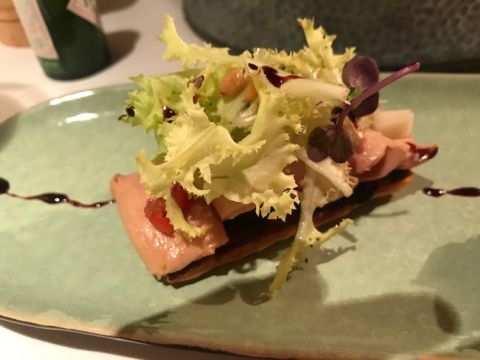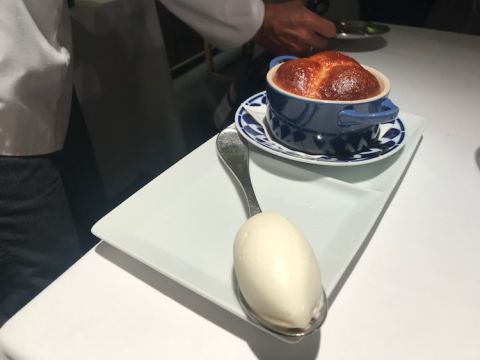As I was waiting to pay my bill of €273 ($305) after our excellent dinner for four at Petit Comitè restaurant in the heart of Barcelona, I could not help but overhear the following conversation.
Melani Sevilla, a particularly charming sommelier who is now the restaurant’s general manager, asked the receptionist, ‘How many customers did we look after tonight?’ ‘58', came the prompt response.
Sevilla smiled but then turned to me and explained with something of a frown, ‘At the beginning of this service though, it was quite a rush. Our lunch customers only left at 6.30 pm and our first dinner customers arrived at 7.30 pm so we had less than an hour to get the restaurant ready and grab something to eat ourselves.’
Anyone who has ever visited Spain knows that its particular restaurant hours need to be longer and more flexible than perhaps in any other country. This is due to a combination of the Spaniards’ own custom of eating late and many tourists’ inability to adapt to these hours, as well as the additional appeal to both of wine and digestifs.
But today, the current working system that can cope with this is under threat. Partly in response to the fact that certain restaurants have been exploiting their staff, legislation was introduced earlier this year that limits everyone’s working shift to eight hours per day, on pain of a substantial fine. When a 35-hour week was introduced in France in 2001, it led to numerous restaurants choosing to close for whole days as well as a decline in the standard of that country’s cooking. A similar straitjacket approach may not suit the Spanish restaurant industry that has over the years become notably flexible.
Whether this will have any deleterious effect on the quality, or warmth, of the service or the cooking at Petit Comitè, I doubt. Sevilla is bolstered by the presence of head waiter Francisco Ibernon. And the restaurant is part of a group built up over the past 24 years by chef Nandu Jubany with his wife Anna Orte. The group today incorporates 20 restaurants, including Foc in Singapore, as well as a substantial catering business.
Jubany started his professional career with one natural advantage in that he grew up in his parents’ restaurant in the Catalan countryside. But he must also have great powers of leadership and inspiration as everything that we ate, and drank, was of the highest quality.
The smart restaurant is reached up a short flight of stairs from the more casual bar, called Impur, where I noticed a party of young Spaniards were settling in just as we were leaving towards midnight. The dining room is comfortable with an open kitchen off it. Acoustics and sight lines are excellent, too.
The menu is conventionally long and replete with ingredients beloved by Catalans: pigs’ ears, sea cucumbers, octopus, and the renowned red prawns caught at Blanes, the gateway to the Costa Brava. And our meal opened with a word of caution from our Catalan friends, ‘Do not make the mistake of over-ordering!’
We began with a small bowl of particularly welcome cool ajo blanco, garlic soup enhanced with almonds, a small slice of ham and half a grape. This was followed by two interpretations of two very different ingredients that were both innovative and delicious.
First came their version of a foie gras dish, the foie gras sliced quite thinly and served on top of a piece of almost burnt bread and topped with a mound of a particularly well-dressed salad. The acidity from the dressing cut through the sweetness and richness of the foie gras, to make the whole feel reassuringly less-than-heart-stopping.
Our next dish, pictured top right, was perhaps even more spectacular. Described as a combination of bone marrow and steak tartare topped with pommes soufflés, this sensitively put together the cool meat of the tartare in between the succulent, hot meat of the bone marrow and the crispness of the potatoes. Eaten with a teaspoon, its juices mopped up with a slice of their delicious sourdough bread, this would be a fitting candidate were I ever asked to nominate my desert island dish. With this we enjoyed a Lagar do Merens 2017, a cult white wine from Ribeiro in Galicia.
With our main courses, we did show a little restraint ordering only three between four (sharing happily countenanced by the management here). One dish was cannelloni, a particularly popular pasta in Catalonia, stuffed with chicken, and two rice dishes. Their black rice dish is based on squid ink while the other, much redder and brighter, was enlivened with monkfish, sea cucumber and topped with shrimps.
We finished with two desserts, both traditional in essence, eschewing the vast number on the dessert trolley. The first was the very Catalan combination of chocolate mousse, olive oil, an ingredient that accentuates the chocolate’s sweetness, topped with flakes of sea salt. The second was the kitchen’s take on a rum baba, the brioche dough topped with flambéed rum and vanilla ice cream.
Petit Comitè seems to be a happy restaurant that left us feeling very happy indeed.
Petit Comitè Passatge de la Concepció 13, 08008 Barcelona; tel +34 936 337627
















